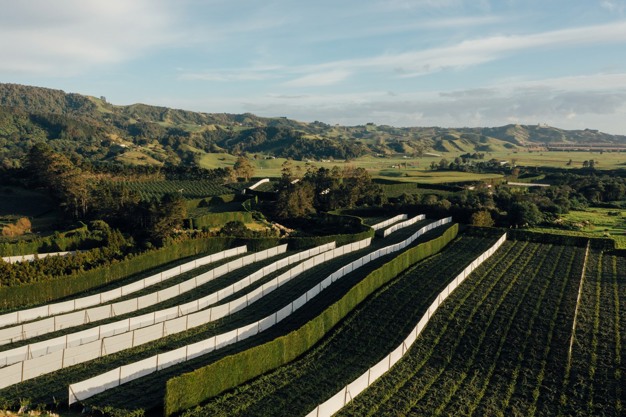 Climate change and adverse weather events associated with it, such as frost, hail, cyclones, heavy rains, and heat waves, present challenges to kiwi production and require new, more environmentally friendly ways of growing, packaging, and transporting the product. The world in which companies like Zespri operate is changing rapidly, driven by consumer expectations and increasing regulatory demands. According to Rachel Depree, Zespri's Executive Director of Sustainability, adapting to these changes and preparing for the future is essential. The company's goal is to reduce its carbon footprint, make farming systems more resilient and, at the same time, help its consumers lead healthier lifestyles.
Climate change and adverse weather events associated with it, such as frost, hail, cyclones, heavy rains, and heat waves, present challenges to kiwi production and require new, more environmentally friendly ways of growing, packaging, and transporting the product. The world in which companies like Zespri operate is changing rapidly, driven by consumer expectations and increasing regulatory demands. According to Rachel Depree, Zespri's Executive Director of Sustainability, adapting to these changes and preparing for the future is essential. The company's goal is to reduce its carbon footprint, make farming systems more resilient and, at the same time, help its consumers lead healthier lifestyles.
What are the next steps to make the industry more sustainable? What are Zespri's goals for the next decade and how do you plan to achieve them?
The world in which we operate is changing rapidly, driven by consumer expectations and increasing regulatory demands. We must adapt to these changes and prepare for the future.
We at Zespri, have set ourselves ambitious goals. By 2035, we want to be carbon-positive across our supply chain, and by 2025, we aim to have 100% recyclable, reusable, or compostable packaging. However, we face challenges such as the high cost of transitioning to more sustainable materials and the lack of recycling infrastructure in some key markets.
We will work hand in hand with producers, partners, and communities to achieve these goals. Through collaboration and innovation, we can reduce our carbon footprint, make farming systems more resilient, and at the same time help our consumers lead healthier lifestyles. This way, we are well-positioned to contribute to the transformation of the global food system.
We focus on strengthening resilience throughout our supply chain, collaborating with our partners to reduce environmental impact, and ensuring that the success of our industry also benefits the communities in which we operate.
How does Zespri collaborate with its partners to promote sustainable practices in its supply chain?
Cooperation across the industry is essential to bring about real change in the food system. It's something that we consider a priority at Zespri.
While Kiwi has a relatively low emissions footprint compared to other products, we are aware that there's still much to be done, especially in our supply chain, which is the main source of emissions. That's why we work closely with producers, exporters, transporters, and governments to ensure a sustainable future for kiwi cultivation.
One of our most important initiatives is the carbon neutrality test. We have developed the first carbon footprint calculator for kiwi orchards, allowing producers to measure their emissions, compare them to the sector average, and find opportunities for improvement.
Shipping, which accounts for more than 40% of our emissions by product, is another crucial aspect. We have made progress in understanding the challenges of adopting low-emission shipping and have championed change. This has allowed us to reduce emissions from transporting fruit from New Zealand year on year.
In addition, we have established a pioneering partnership with a global green shipping provider, an unprecedented achievement between an exporter and a shipping company. This collaboration aims to accelerate the adoption of low-emission technologies and explore the feasibility of sustainable routes between Europe and New Zealand.
We know there's a long road ahead, but we believe it is critical to start now. Collaborating with other leaders in the primary sector helps us catalyze change and find solutions that benefit everyone, reducing environmental impact, lowering costs, and increasing resilience.

Climate change is a major concern for agriculture, what steps is Zespri taking to help farmers adapt to this challenge?
In recent years, farmers have faced adverse weather events such as frost, hail, cyclones, heavy rains, and heat waves. In addition, warmer winters have affected the crops' growth, reducing crop yields.
Mitigating these risks is crucial to ensuring sustainable value, which drives many of our goals, including our commitment to carbon neutrality in the industry. We have already implemented several initiatives to assess the landscape and define the best way to respond to these challenges, such as our Climate Change Risks and Opportunities Report, our Climate Change Strategy, and Adaptation Plan.
However, much remains to be done. Our science-based roadmap to zero neutrality poses significant challenges in terms of decarbonization. We are currently focused on exploring new technologies, innovative farming methods, and resilient kiwi varieties that help minimize our exposure to extreme weather events while optimizing fruit production sustainably and with less labor demand.
How does your vision align with the global transformation of the food system?
Looking at the current food system, we find two key facts that underscore the urgency of change. First, there is the 90/10 paradox, in which 90% of the population recognizes the importance of a healthy lifestyle but only 10% of people adopt consistent practices. Second, food production is responsible for one-third of global emissions.
These two points highlight the need for action. At Zespri, we are convinced that we can be a driver of change, offering delicious, nutritious fruit with a low environmental impact. As we seek to meet the growing demand for kiwi, we focus on how our industry can be part of the global transformation, helping to bridge the 90/10 gap.
Our sustainability framework guides us in this mission. It is based on three pillars: fruit, the environment, and communities.
Initiatives such as New Zealand's Xlabs: Future of Food program, which investigates how to accelerate the adoption of low-emission solutions in orchards and post-harvest operations, are central to this process. In addition, our ZAG innovation fund, with an annual allocation of $2 million, fosters partnerships with visionary innovators who develop solutions to address these challenges.
What role does this fruit play in promoting healthier diets and transforming the food system?
We strongly believe that we can lead change by showing that there are products like kiwi that are not only delicious and healthy but also sustainably produced. We want people to see our brand and associate our product with well-being and responsibility.
One of our most successful strategies has been the creation of the Kiwi Brothers, a campaign that has highlighted the multiple nutritional benefits of our kiwis entertainingly and attractively. In addition, we have launched initiatives such as "Choose Real" in Europe, which encourages people to incorporate fresh, healthy food into their daily diet. In Japan, our healthy eating campaign focuses on improving public health by replacing unhealthy foods with fresh fruit or vegetables.
We also promote the daily consumption of kiwi through our Fruit Box, which uses sustainable packaging to encourage the adoption of healthier habits. We want to offer delicious fruit, but we also want to be part of a wider transformation in the food system, promoting better eating habits and global nutrition.
For more information: https://www.zespri.com/es-ES
